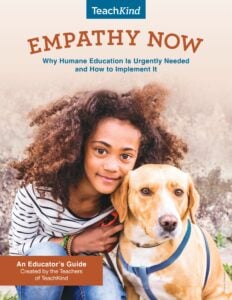Epidemic:
Kids Hurting Animals
Kids Hurting Animals
As mental-health and law-enforcement experts well know, cruelty to animals and violence against humans are inextricably linked. Many educators are aware that serial killers and school shooters—including alleged killers Salvador Ramos, Payton Gendron, Nikolas Cruz, and Ethan Crumbley—tend to have a history of cruelty to animals, and Sandy Hook Promise has cruelty to animals on its “10 Critical Warning Signs of Violence” list.
Forty-three percent of perpetrators of schoolyard massacres commit acts of cruelty to animals first. Educators can help prevent future tragedies by including kindness to animals in the curriculum. Amid the current epidemic of youth violence, PETA urges everyone to report every act of cruelty against animals and calls on authorities to take each animal abuse claim seriously—for the sake of the animal victims and to help prevent future harm. Lives may depend on it.
Select your state or province to view its laws that pertain to teaching about kindness to animals as well as its incidents of youth violence against animals.
DON’T MISS THE SIGNS
Young people who abuse animals often go on to commit acts of violence against humans. Animals have often been targets of aggression prior to school shootings.
PREVENT FUTURE TRAGEDIES
Many states and provinces have enacted laws mandating instruction in kindness, compassion, and justice. By vigorously enforcing these laws, we can foster children’s empathy for animals and prevent future acts of violence.
